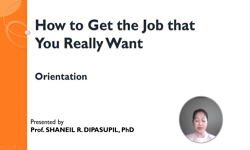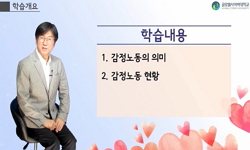In order to accomplish the purpose of this study, we derived the multiple role commitment of married female flight attendants, the job performance, the emotional labor parameter, and the psychological well - being, the control variable, based on the p...
http://chineseinput.net/에서 pinyin(병음)방식으로 중국어를 변환할 수 있습니다.
변환된 중국어를 복사하여 사용하시면 됩니다.
- 中文 을 입력하시려면 zhongwen을 입력하시고 space를누르시면됩니다.
- 北京 을 입력하시려면 beijing을 입력하시고 space를 누르시면 됩니다.

The study on the moderating effect of psychological well-being between the multiple roles of married flight attendants and job performance
한글로보기https://www.riss.kr/link?id=A106186680
- 저자
- 발행기관
- 학술지명
- 권호사항
-
발행연도
2019
-
작성언어
English
- 주제어
-
등재정보
KCI등재
-
자료형태
학술저널
-
수록면
15-28(14쪽)
-
KCI 피인용횟수
0
- DOI식별코드
- 제공처
-
0
상세조회 -
0
다운로드
부가정보
다국어 초록 (Multilingual Abstract)
In order to accomplish the purpose of this study, we derived the multiple role commitment of married female flight attendants, the job performance, the emotional labor parameter, and the psychological well - being, the control variable, based on the previous research. After that, the questionnaire was used for empirical analysis and it was conducted for a married female flight attendant working on an international flight of K and A Airlines, a Korean national full service carrier (FSC) airline. A total of 394 responses were used for data analysis. As a result of this research, it was found that family role, friend role, community role, and job role, which are sub - factors of multi - role commitment of married female flight attendant have significant influence on emotional labor. In addition, the role of community and job role only had a significant effect on job performance in relation to multiple role commitment and job performance. In the relationship between emotional labor and job performance, deep acting of emotional labor affects job performance. In the mediating effect of emotional labor, emotional labor acts as a parameter in the relationship between family role and job performance. Other friends, community, and job roles did not have mediating effects. In the moderating effect of psychological well-being, the psychological well-being was shown to have a significant moderating effect only in the relationship between the roles of multiple roles and emotional labor, and the results of the other family, friends and community roles were not significant.
참고문헌 (Reference)
1 Betz, N., "handbook of career counseling for women" Routledge 55-84, 2006
2 Sirgy, M. J., "Work-Life Balance: an Integrative Review" 13 (13): 229-254, 2018
3 Greenhaus, J. H., "When work and family are allies : A theory of work-family enrichment" 31 (31): 72-92, 2006
4 Chu, K. H., "When we are onstage, we smile : The effects of emotional labor on employee work outcomes" 31 (31): 906-915, 2012
5 Barnett, R. C., "Toward a review and reconceptualization of the work/family literature" 124 (124): 125-, 1998
6 Page, K. M., "The ‘what’, ‘why’and ‘how’ of employee well-being : A new model" 90 (90): 441-458, 2009
7 Liu, Y., "The relationship between emotional resources and emotional labor : An exploratory Study" 38 (38): 2410-2439, 2008
8 McCullough, M. E., "The grateful disposition : a conceptual and empirical topography" 82 (82): 112-, 2002
9 Babin, B. J., "The effects of perceived co-worker involvement and supervisor support on service provider role stress, performance and job satisfaction" 72 (72): 57-75, 1996
10 Hochschild, A. R., "The Managed Heart" University of California Press 1983
1 Betz, N., "handbook of career counseling for women" Routledge 55-84, 2006
2 Sirgy, M. J., "Work-Life Balance: an Integrative Review" 13 (13): 229-254, 2018
3 Greenhaus, J. H., "When work and family are allies : A theory of work-family enrichment" 31 (31): 72-92, 2006
4 Chu, K. H., "When we are onstage, we smile : The effects of emotional labor on employee work outcomes" 31 (31): 906-915, 2012
5 Barnett, R. C., "Toward a review and reconceptualization of the work/family literature" 124 (124): 125-, 1998
6 Page, K. M., "The ‘what’, ‘why’and ‘how’ of employee well-being : A new model" 90 (90): 441-458, 2009
7 Liu, Y., "The relationship between emotional resources and emotional labor : An exploratory Study" 38 (38): 2410-2439, 2008
8 McCullough, M. E., "The grateful disposition : a conceptual and empirical topography" 82 (82): 112-, 2002
9 Babin, B. J., "The effects of perceived co-worker involvement and supervisor support on service provider role stress, performance and job satisfaction" 72 (72): 57-75, 1996
10 Hochschild, A. R., "The Managed Heart" University of California Press 1983
11 Diener, E., "Subjective well-being : Three decades of progress" 125 (125): 276-302, 1999
12 Byrne, B. M., "Structural equation modeling with LISREL, PRELIS and SIMPLIS: Basic concepts, applications, and programming" Lawrence Erlbaum Associates, Inc 1998
13 Wright, T. A., "State and trait correlates of job performance : A tale of two perspectives" 18 (18): 365-383, 2004
14 Greenhaus, J. H., "Sources of conflict between work and family roles" 10 (10): 76-88, 1985
15 Turner, W. L., "Shopping satisfaction for domestic tourists" 8 (8): 15-27, 2001
16 Parasuraman, A., "Service firms need marketing skills" 26 (26): 28-31, 1983
17 Fort, I., "Self-efficacy, goals, and job search behaviors" 16 (16): 469-481, 2011
18 Grzywacz, J. G., "Reconceptualizing the work-family interface : An ecological perspective on the correlates of positive and negative spillover between work and family" 5 (5): 111-126, 2000
19 Edmondson, A., "Psychological safety and learning behavior in work teams" 44 (44): 350-383, 1999
20 Milkie, M. A., "Playing all the roles : Gender and the work-family balancing act" 61 (61): 476-490, 1999
21 Borman, W. C., "Personality predictors of citizenship performance" 9 (9): 52-69, 2001
22 Organ, D. W., "Personality and organizational citizenship behavior" 20 (20): 465-478, 1994
23 Bagozzi, R. P., "On the evaluation of structural equation models" 16 (16): 74-94, 1988
24 Thoits, P. A., "Multiple identities and psychological well-being:A reformulation and test of the social isolation hypothesis" 174-187, 1983
25 Carlson, D. S., "Measuring the positive side of the work-family interface : Development and validation of a work-family enrichment scale" 68 (68): 131-164, 2006
26 Nembhard, I. M., "Making it safe : The effects of leader inclusiveness and professional status on psychological safety and improvement efforts in health care teams" 27 (27): 941-966, 2006
27 Sheldon, K. M., "How to increase and sustain positive emotion : The effects of expressing gratitude and visualizing best possible selves" 1 (1): 73-82, 2006
28 Tharenou, P., "How do you make it to the top? An examination of influences on women's and men's managerial advancement" 37 (37): 899-931, 1994
29 Ryff, C. D., "Happiness is everything, or is it? Explorations on the meaning of psychological well-being" 57 (57): 1069-1081, 1989
30 Fitzgerald, L. F., "Handbook of vocational psychology: Theory, research, and practice" Lawrence Erlbaum Associates, Inc 67-109, 1995
31 Frone, M. R., "Handbook of occupational health psychology" American Psychological Association 143-162, 2003
32 Malley, J. E., "Handbook of life stress, cognition and health" John Wiley & Sons 175-191, 1988
33 Greenhaus, J. H., "Handbook of gender and work" Sage Publications, Inc 391-412, 1999
34 George, J. M., "Feeling good-doing good : a conceptual analysis of the mood at work-organizational spontaneity relationship" 112 (112): 310-329, 1992
35 Adelmann, P. K., "Facial efference and the experience of emotion" 40 (40): 249-280, 1989
36 Kruml, S. M., "Exploring the dimensions of emotional labor, the heart of Hochschild’s work" 14 (14): 8-49, 2000
37 Motowidlo, S. J., "Evidence that task performance should be distinguished from contextual performance" 79 (79): 475-480, 1994
38 Formell, C., "Evaluating structural equation models with unobservable variables and measurement error" 18 (18): 39-50, 1981
39 Rothbard, N. P., "Enriching or depleting? The dynamics of engagement in work and family roles" 46 (46): 655-684, 2001
40 Grandey, Alicia A., "Emotional regulation in the workplace : A new way to conceptualize emotional labor" 5 (5): 95-110, 2004
41 Ashforth, B. E., "Emotional labor in service roles : The influence of identity" 18 : 88-115, 1993
42 Gosserand, R. H., "Emotional display rules and emotional labor : The moderating role of commitment" 90 (90): 1256-1264, 2005
43 Folkman, S., "Dynamics of a stressful encounter : cognitive appraisal, coping, and encounter outcomes" 50 (50): 992-1003, 1986
44 Jose, S. G., "Customer satisfaction in the hospitality industry in Guadalajara, Mexico" 19 (19): 17-33, 2011
45 Pincus, J. D., "Communication satisfaction, job satisfaction, and job performance" 12 (12): 395-419, 1986
46 Miles, D. E., "Building an integrative model of extra role work behaviors:A comparison of counterproductive work behavior with organizational citizenship behavior" 10 (10): 51-57, 2002
47 Ruderman, M. N., "Benefits of multiple roles for managerial women" 45 (45): 369-386, 2002
48 Schaubroeck, J., "Antecedents of workplace emotional labor dimensions and moderators of their effects on physical symptoms" 21 (21): 163-183, 2000
49 Frone, M. R., "Antecedents and outcomes of work-family conflict : testing a model of the work-family interface" 77 (77): 65-78, 1992
50 McElwain, A. K., "An examination of gender differences in work-family conflict" 37 (37): 283-293, 2005
51 Bettencourt, L. A., "A comparison of attitude, personality, and knowledge predictors of service-oriented organizational citizenship behaviors" 86 (86): 29-, 2001
동일학술지(권/호) 다른 논문
-
Chain restaurant brand and patrons’ post-purchase behaviors in the steakhouse context
- 한국관광연구학회
- 한희섭
- 2019
- KCI등재
-
Fairness scale development in the tourism domain
- 한국관광연구학회
- 박세영
- 2019
- KCI등재
-
- 한국관광연구학회
- Li-Fei Wang
- 2019
- KCI등재
-
Antecedents and consequence of emotional attachment in the casino industry
- 한국관광연구학회
- 황진수
- 2019
- KCI등재
분석정보
인용정보 인용지수 설명보기
학술지 이력
| 연월일 | 이력구분 | 이력상세 | 등재구분 |
|---|---|---|---|
| 2026 | 평가예정 | 재인증평가 신청대상 (재인증) | |
| 2020-01-01 | 평가 | 등재학술지 유지 (재인증) |  |
| 2017-01-01 | 평가 | 등재학술지 유지 (계속평가) |  |
| 2014-01-28 | 학술지명변경 | 외국어명 : Korea Journal of Tourism and Hospitality Research -> International Journal of Tourism and Hospitality Research |  |
| 2013-01-01 | 평가 | 등재학술지 유지 (등재유지) |  |
| 2010-01-01 | 평가 | 등재학술지 선정 (등재후보2차) |  |
| 2009-01-01 | 평가 | 등재후보 1차 PASS (등재후보1차) |  |
| 2008-01-01 | 평가 | 신청제한 (등재후보1차) |  |
| 2007-12-25 | 학술지명변경 | 외국어명 : 미등록 -> Korea Journal of Tourism and Hospitality Research |  |
| 2007-01-01 | 평가 | 등재후보학술지 유지 (등재후보2차) |  |
| 2006-03-29 | 학술지등록 | 한글명 : 관광연구저널외국어명 : 미등록 |  |
| 2006-01-01 | 평가 | 등재후보 1차 PASS (등재후보1차) |  |
| 2004-01-01 | 평가 | 등재후보학술지 선정 (신규평가) |  |
학술지 인용정보
| 기준연도 | WOS-KCI 통합IF(2년) | KCIF(2년) | KCIF(3년) |
|---|---|---|---|
| 2016 | 1.95 | 1.95 | 1.84 |
| KCIF(4년) | KCIF(5년) | 중심성지수(3년) | 즉시성지수 |
| 1.82 | 1.8 | 2.18 | 0.68 |




 DBpia
DBpia





